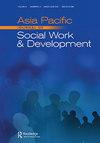COVID-19大流行期间小组工作的经验教训
IF 1
4区 社会学
Q3 SOCIAL WORK
Asia Pacific Journal of Social Work and Development
Pub Date : 2020-10-30
DOI:10.1080/02185385.2020.1840424
引用次数: 1
摘要
这篇反思性文章旨在详细介绍为感染COVID-19的农民工开展小组工作的经验教训。为了应对迅速出现的社会心理需求,陈笃生医院的医务社会工作者(MSWs)构思并促进了旨在改善工人社会心理健康的活动。需要对迅速演变的社会心理需求作出反应,这意味着系统地评估需求和评价活动的时间有限。鼓励非语言表达形式的活动有助于克服语言障碍,采用参与性模式对这些活动进行持续评估和评价有助于为这一弱势群体创造一种文化上更适当的干预。本文章由计算机程序翻译,如有差异,请以英文原文为准。
Lessons learnt from group work during COVID-19 pandemic
ABSTRACT This reflective essay seeks to detail lessons learnt from conducting group work for migrant workers with COVID-19. In response to rapidly emerging psychosocial needs, Medical Social Workers (MSWs) from Tan Tock Seng Hospital conceptualised and facilitated activities targeted at improving the workers’ psychosocial well-being. The need for response to rapidly evolving psychosocial needs meant limited time for systematic needs assessment and evaluation of activities. Activities encouraging non-verbal forms of expression were useful in overcoming language barriers and adoption of the participatory paradigm for ongoing assessment and evaluation of the activities helps create a more culturally appropriate intervention for this vulnerable population.
求助全文
通过发布文献求助,成功后即可免费获取论文全文。
去求助
来源期刊

Asia Pacific Journal of Social Work and Development
SOCIAL WORK-
CiteScore
4.10
自引率
5.00%
发文量
21
 求助内容:
求助内容: 应助结果提醒方式:
应助结果提醒方式:


